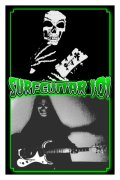Klas
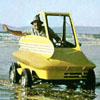
Joined: Feb 26, 2006
Posts: 2289
Stockholm, Sweden



|

Posted on Jan 27 2024 07:21 AM
Off topic, but I remember being very surprised that Frankie was allowed to smoke a joint and then pass it on to Deadhead in a 1963 all-audiences beach party movie!
— T H E ✠ S U R F I T E S
|
DeathTide

Joined: Apr 13, 2018
Posts: 1371
New Orleans





|

Posted on Jan 27 2024 09:24 AM
ElectricLimnology wrote:
Beautiful post! You really nailed down a lot of specifics that match my definition of Surf as well. I did not quite understand your breakdown of the beat. To me, it is a single snare on the 2, and a double hit on the 4. But then again my favorite surf song Bombora does not use that bit at all. I do think you could elaborate on the distinction between the original "classic surf" and everything that came afterwards. There is a lot of music that has surfy elements without being surf music. And I absolutely agree that the reverb and the ocean are a big part of it! When I'm at the beach I am always listening to the waves. I enjoy the far away ones that are more like our traditional strummed reverb, then the close waves that are more staccato and drippy. It's really a wonderful soundscape to stand on a beach. Surf music implies this heavily.
— Daniel Deathtide
|
synchro

Joined: Feb 02, 2008
Posts: 4351
Not One-Sawn, but Two-Sawn . . . AZ.





|

Posted on Jan 27 2024 09:40 AM
Klas wrote:
Off topic, but I remember being very surprised that Frankie was allowed to smoke a joint and then pass it on to Deadhead in a 1963 all-audiences beach party movie!
That is surprising. There were some elements of a Beatnick vibe portrayed in other parts of the clip, so I see the tie-in, but in ‘63, Pot was not accepted in the overall society.
— The artist formerly known as: Synchro
When Surf Guitar is outlawed only outlaws will play Surf Guitar.
|
ElectricLimnology
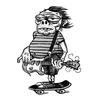
Joined: Nov 20, 2017
Posts: 110
Southeast MIchigan


|

Posted on Jan 27 2024 09:43 AM
synchro wrote:
For the sake of saving space on the page, I won’t quote you, Electric Limnology, but that is a well-reasoned approach.
I think that there is a degree of linkage to Blues, but Surf is not structured on a 12 Bar (Major) Blues very often. Elements of minor key Blues show up, especially the VI-V, turnaround, which is ubiquitous in minor blues and shows up in a fair number of Surf pieces. But even in the cases where there are harmonic similarities to Blues, the feel is entirely different.
The Andalusian Cadence shows up in a lot of Surf, or at least modifications of the Andalusian Cadence. Mr. Moto is a good example, starting on D min, skipping the C Maj altogether, then doing the VI-V with Bb to A. The bridge ends with a VI-V in a new tone center, A minor which just sort of naturally finds its way back to D minor, after 16 bars. It’s a brilliant composition, and utilizes the Andalusian Cadence as a concept, but it doesn’t adhere to it so strictly that it risks sounding like a reheated version of Walk, Don’t Run.
Aah the “Andalusian Cadence”! I was not familiar with the term. Good to know.
— The Vicissitones
Diesel Marine
The Rasputones
|
ElectricLimnology

Joined: Nov 20, 2017
Posts: 110
Southeast MIchigan


|

Posted on Jan 27 2024 09:45 AM
DeathTide wrote:
ElectricLimnology wrote:
Beautiful post! You really nailed down a lot of specifics that match my definition of Surf as well. I did not quite understand your breakdown of the beat. To me, it is a single snare on the 2, and a double hit on the 4. But then again my favorite surf song Bombora does not use that bit at all. I do think you could elaborate on the distinction between the original "classic surf" and everything that came afterwards. There is a lot of music that has surfy elements without being surf music. And I absolutely agree that the reverb and the ocean are a big part of it! When I'm at the beach I am always listening to the waves. I enjoy the far away ones that are more like our traditional strummed reverb, then the close waves that are more staccato and drippy. It's really a wonderful soundscape to stand on a beach. Surf music implies this heavily.
Deathtide, single hits on the 2 and doubles on the 4 is more accurate. I’m not sure why I described the beat backwards. It was very late.
— The Vicissitones
Diesel Marine
The Rasputones
|
synchro

Joined: Feb 02, 2008
Posts: 4351
Not One-Sawn, but Two-Sawn . . . AZ.





|

Posted on Jan 27 2024 10:02 AM
ElectricLimnology wrote:
synchro wrote:
For the sake of saving space on the page, I won’t quote you, Electric Limnology, but that is a well-reasoned approach.
I think that there is a degree of linkage to Blues, but Surf is not structured on a 12 Bar (Major) Blues very often. Elements of minor key Blues show up, especially the VI-V, turnaround, which is ubiquitous in minor blues and shows up in a fair number of Surf pieces. But even in the cases where there are harmonic similarities to Blues, the feel is entirely different.
The Andalusian Cadence shows up in a lot of Surf, or at least modifications of the Andalusian Cadence. Mr. Moto is a good example, starting on D min, skipping the C Maj altogether, then doing the VI-V with Bb to A. The bridge ends with a VI-V in a new tone center, A minor which just sort of naturally finds its way back to D minor, after 16 bars. It’s a brilliant composition, and utilizes the Andalusian Cadence as a concept, but it doesn’t adhere to it so strictly that it risks sounding like a reheated version of Walk, Don’t Run.
Aah the “Andalusian Cadence”! I was not familiar with the term. Good to know.
Once you become aware of it, you find it everywhere. Softly, As In A Morning Sunrise, Walk Don’t Run, Stray Cat Strut, Sultans Of Swing, and I believe that it has its roots in the ancient Middle East, probably going back thousands of years.
— The artist formerly known as: Synchro
When Surf Guitar is outlawed only outlaws will play Surf Guitar.
Last edited: Jan 27, 2024 10:02:46
|
ElectricLimnology

Joined: Nov 20, 2017
Posts: 110
Southeast MIchigan


|

Posted on Jan 27 2024 11:26 AM
The pages below are from Joe Carducci’s book “Rock And The Pop Narcotic: Testament For The Electric Church”. He was among other things an A&R man and co owner of SST records in the 1980s. The book is concerned with defining rock music in aesthetic terms and it is something to behold. His writing can be a bit rough for some as he writes from a more conservative point of view that breaks down the class and race issues inherent to the subject. Anyway, these scans are from a section touching on surf music. It’s worth looking at.
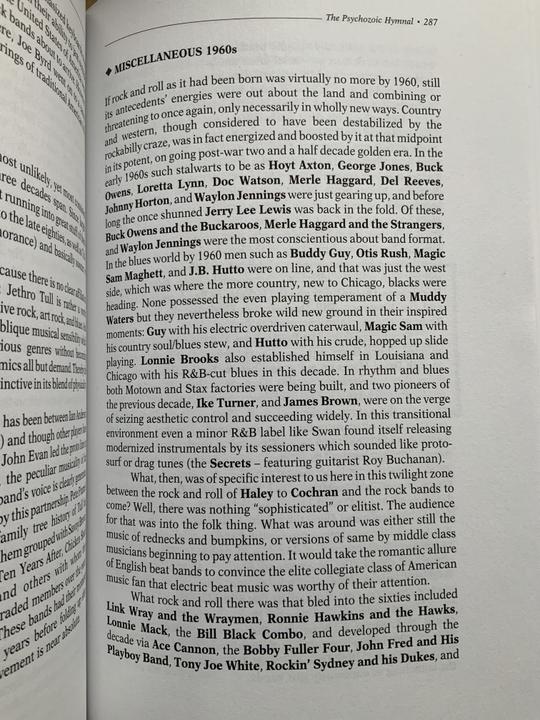
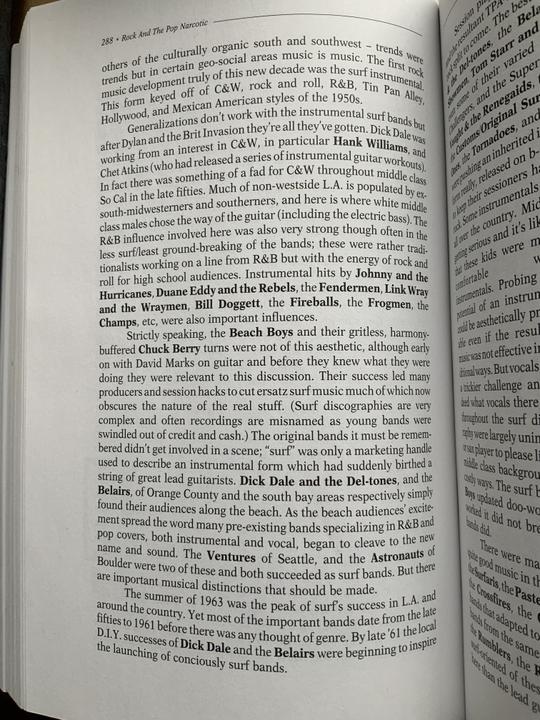
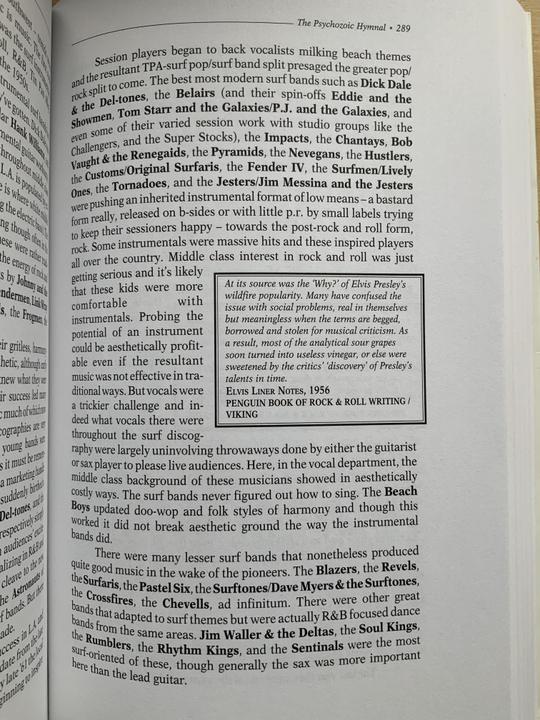
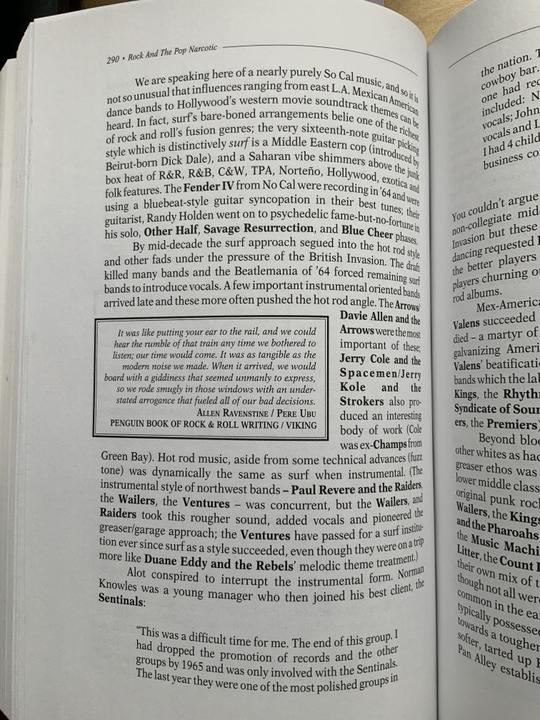
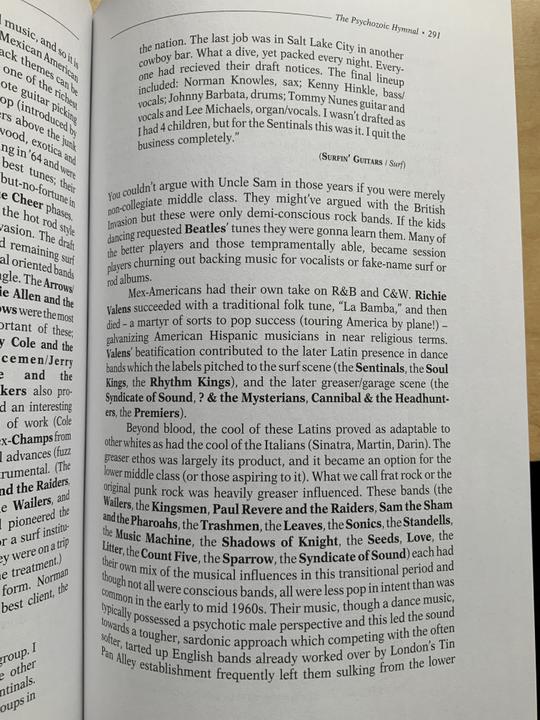
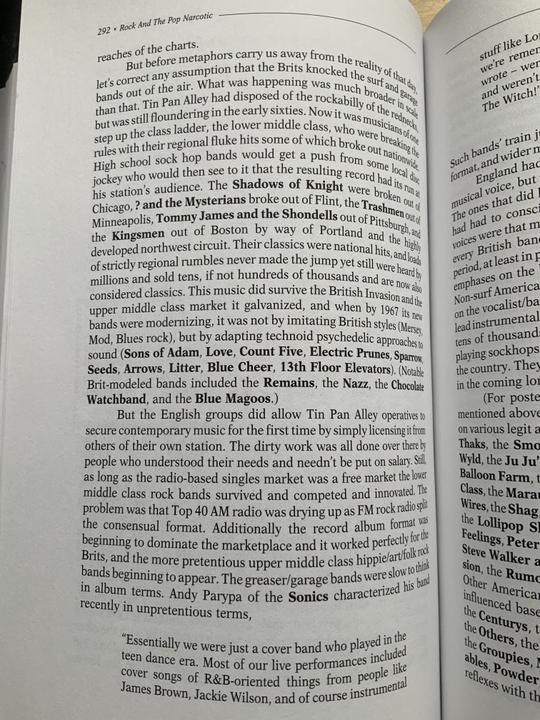
— The Vicissitones
Diesel Marine
The Rasputones
|
synchro

Joined: Feb 02, 2008
Posts: 4351
Not One-Sawn, but Two-Sawn . . . AZ.





|

Posted on Jan 27 2024 10:07 PM
I find it interesting that Carducci point out that many of the important Surf bands had roots that reached back into the late ‘50s or up until ‘61. I had noticed something similar. Once lightning struck, there were a lot of new bands, and many were quite good, but no matter what the genre, if you find success, there will be others wanting to try something similar. Sometimes these efforts fail, but sometimes they succeed brilliantly.
LA was a great place for various influences to come together, and I’m sure that played a role, too. When Country met R&B, Rock n’ Roll came about. When a fellow of Lebanese origin combined the music he had heard as a child with the music he heard on American radio, lightening struck hard, and that may be the seminal moment where Instrumental Rock (which had been around for a few years) found a new direction. Through this forum, I have observed that Surf seems popular in the Middle East and the Balkan Peninsula, and I suspect that music local to those areas dovetails nicely with Surf.
About the same time as Surf was exploding, the James Bond movies came out, and the themes used in Dr. No and Goldfinger had guitar work that at least bore a family resemblance to Surf, and as the author mentions, Hot Rod music came along, close on the heels of Surf. Hot Rod songs pretty much needed vocals and were a way to fight back against the fact that the Beatles had placed vocals front and center.
How does lightning choose when and where to strike? Surf would have been much harder to produce ten years earlier, because the amps required were not yet available. Surf or not, I find it unsurprising that there was cleanish guitar based music with reverb and tremolo, at this time. Equipment wise, the time had come. It just so happened to come on at a time and place where all the elements were waiting for it.
— The artist formerly known as: Synchro
When Surf Guitar is outlawed only outlaws will play Surf Guitar.
|
DrakeSequation
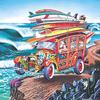
Joined: Nov 22, 2016
Posts: 79
PNW
|

Posted on Jan 28 2024 04:53 PM
synchro wrote:
I find it interesting that Carducci point out that many of the important Surf bands had roots that reached back into the late ‘50s or up until ‘61. I had noticed something similar. Once lightning struck, there were a lot of new bands, and many were quite good, but no matter what the genre, if you find success, there will be others wanting to try something similar. Sometimes these efforts fail, but sometimes they succeed brilliantly.
LA was a great place for various influences to come together, and I’m sure that played a role, too. When Country met R&B, Rock n’ Roll came about. When a fellow of Lebanese origin combined the music he had heard as a child with the music he heard on American radio, lightening struck hard, and that may be the seminal moment where Instrumental Rock (which had been around for a few years) found a new direction. Through this forum, I have observed that Surf seems popular in the Middle East and the Balkan Peninsula, and I suspect that music local to those areas dovetails nicely with Surf.
About the same time as Surf was exploding, the James Bond movies came out, and the themes used in Dr. No and Goldfinger had guitar work that at least bore a family resemblance to Surf, and as the author mentions, Hot Rod music came along, close on the heels of Surf. Hot Rod songs pretty much needed vocals and were a way to fight back against the fact that the Beatles had placed vocals front and center.
How does lightning choose when and where to strike? Surf would have been much harder to produce ten years earlier, because the amps required were not yet available. Surf or not, I find it unsurprising that there was cleanish guitar based music with reverb and tremolo, at this time. Equipment wise, the time had come. It just so happened to come on at a time and place where all the elements were waiting for it.
Or if Fender, who’s guitars, amps and reverb unit were the backbone of surf had been headquartered anywhere other than Southern California. Much of Fender’s R & D was done by locals that were in the surf scene.
— Makai
|
synchro

Joined: Feb 02, 2008
Posts: 4351
Not One-Sawn, but Two-Sawn . . . AZ.





|

Posted on Jan 28 2024 05:41 PM
DrakeSequation wrote:
synchro wrote:
I find it interesting that Carducci point out that many of the important Surf bands had roots that reached back into the late ‘50s or up until ‘61. I had noticed something similar. Once lightning struck, there were a lot of new bands, and many were quite good, but no matter what the genre, if you find success, there will be others wanting to try something similar. Sometimes these efforts fail, but sometimes they succeed brilliantly.
LA was a great place for various influences to come together, and I’m sure that played a role, too. When Country met R&B, Rock n’ Roll came about. When a fellow of Lebanese origin combined the music he had heard as a child with the music he heard on American radio, lightening struck hard, and that may be the seminal moment where Instrumental Rock (which had been around for a few years) found a new direction. Through this forum, I have observed that Surf seems popular in the Middle East and the Balkan Peninsula, and I suspect that music local to those areas dovetails nicely with Surf.
About the same time as Surf was exploding, the James Bond movies came out, and the themes used in Dr. No and Goldfinger had guitar work that at least bore a family resemblance to Surf, and as the author mentions, Hot Rod music came along, close on the heels of Surf. Hot Rod songs pretty much needed vocals and were a way to fight back against the fact that the Beatles had placed vocals front and center.
How does lightning choose when and where to strike? Surf would have been much harder to produce ten years earlier, because the amps required were not yet available. Surf or not, I find it unsurprising that there was cleanish guitar based music with reverb and tremolo, at this time. Equipment wise, the time had come. It just so happened to come on at a time and place where all the elements were waiting for it.
Or if Fender, who’s guitars, amps and reverb unit were the backbone of surf had been headquartered anywhere other than Southern California. Much of Fender’s R & D was done by locals that were in the surf scene.
Leo Fender visited musicians at their gigs, to see firsthand how they used their instruments and what challenges they faced. Famously, he was said to have visited Dick Dale at the Rendezvous, and came away understanding just what was needed, and maybe why Dale was blowing up amps. The Showman amp was the result, named so because he thought of Dick Dale as just that, the Showman.
Obviously. Gibson wouldn’t have had such immediate access to SoCal musicians, but they saw themselves as being in a different business than Fender and didn’t really take these planks with bolt-on necks all that seriously. Ignorance was bliss.
If you look at any development, there are a lot of factors which come together to make things happen. Leo Fender losing an eye made it impossible for him to serve in the military, but put him in just the right place to springboard his business after WW II. The Great Depression bringing all sorts of people from the Dust Bowl into SoCal, and then WW II providing good jobs for these people gave the place a wide range of musical influences, and a ready market for both live music and musical instruments. Teens from prosperous middle class families with access to beaches with great surf provided an audience, and when the amps were getting clean enough, portable reverb became available and Rock n’ Roll was in its sophomore slump, something new was born. If any of these elements had not existed, we might all be meeting at Polka Guitar 101. 
— The artist formerly known as: Synchro
When Surf Guitar is outlawed only outlaws will play Surf Guitar.
|
Joelman

Joined: Sep 07, 2006
Posts: 1482
Redlands, CA



|

Posted on Jan 29 2024 11:11 AM
Surfalbumcovers wrote:
Hey all, I’m 28 and new to the forum. I’ve been obsessed with anything related to Surf music since I was 10. Being on the younger side, I’m curious what y’all use to define surf music for yourselves. I’m sure we all agree that the recognizably wet, Dick Dale Fender sound formed is the nucleus of the genre, but the ultra-clean Challengers style and the later fuzzed-out Davie Allen branch also contributed a great deal to the aesthetic.
I know in John Blair’s discography he has a few parameters he uses to define what belongs and doesn’t and there’s always some debate over vocal tracks and car-themed numbers. Then there’s the orchestral side with Jan Berry and Jack Nitzsche, which is say nothing of the topical branches that inevitably grew out of the genre such skateboarding, skiiing, boating, and biking.
Personally I’m partial to the Wilson/Melcher-Johnston/Usher/Berry conglomerate of vocal tracks, but I’m curious what all your thoughts are on this topic? What parameters do you use to decide what falls under the Surf Music umbrella?
 Good luck at getting an answer everyone agrees on. Good luck at getting an answer everyone agrees on. 
|
 https://sunb...
https://sunb...

